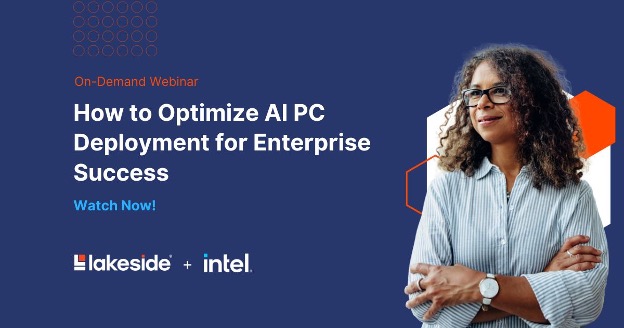
The rise of AI PCs powered by Neural Processing Units (NPUs) has introduced an exciting yet complex challenge for IT leaders: how to make the right hardware investments in a rapidly evolving market. With new AI capabilities emerging, IT teams must ensure they’re making strategic choices based on their organizations’ unique use cases for its AI implementations.
Every company buys new computers—whether it’s part of an old-school calendar-based refresh cycle or, even better, a performance-based hardware optimization strategy. But when buying an AI PC, the decision isn’t as simple as just getting the latest and greatest hardware. You need to understand who can most benefit from having access to AI models on the endpoint (aka “at the edge”), how AI will boost their productivity, and the impact on the digital employee experience (DEX).
So, what should IT leaders consider before investing in AI PCs? Let’s break it down.
Understanding the Shift: The Role of NPUs in AI PCs
For decades, IT buyers focused on CPU and GPU performance, but AI workloads are shifting the paradigm. GPUs, originally designed for graphics processing, later found use in machine learning. Now, NPUs are emerging as specialized chips designed to handle AI tasks efficiently—on the device itself. While not every application currently leverages NPUs, software development is rapidly moving in that direction.
Also consider that AI PCs allow enterprises to embrace edge computing—moving compute power back to the endpoint instead of relying solely on the cloud. This shift has significant benefits, from improved speed to reduced risk related to data security. But do these capabilities mean your company should invest in AI PCs today? The answer depends on your business needs and future plans.
Key Buying Considerations for AI PCs
Here are 10 essential questions to ask before transitioning your enterprise PC fleet to AI PCs:
1. What AI-Based Applications Are You Using Today?
Start by assessing the AI applications currently in use across your organization. Are employees leveraging AI for productivity, automation, or security? Understanding these use cases will help determine the level of AI computing power your end users need.
2. What AI-Based Applications Are in Your Roadmap?
Your IT strategy should align with where your business is headed. If your roadmap includes AI-driven analytics, automation tools, or advanced machine learning models, investing in AI-capable PCs now may be a smart move.
3. What Applications Do You Have (or Must Buy) That Have Embedded AI Capabilities?
Even if your organization isn’t developing AI tools in-house, many enterprise applications are embedding AI features. Collaboration tools, security platforms, and productivity suites are increasingly incorporating AI. Will your current hardware support these enhancements?
4. Does Your Current Hardware Support New AI Workloads?
Not all enterprise PCs are equipped to handle AI workloads efficiently. If your existing hardware lacks AI acceleration, users may experience performance bottlenecks. Assess whether upgrading to AI PCs will provide tangible performance benefits.
5. Should You Invest in AI PCs Now or Wait for the Ecosystem to Mature?
This is one of the biggest dilemmas IT buyers face. While AI PCs are promising, the ecosystem is still evolving. Waiting too long, however, could mean falling behind in AI adoption. Conduct a cost-benefit analysis to determine the right timing for your organization.
6. Do You Get the Same AI PC for Your Entire Company?
A one-size-fits-all approach might not be ideal. Standardizing on a single AI PC model may simplify management, but a tiered approach—offering high-performance devices for power users and more cost-effective options for general employees—can maximize both productivity and cost efficiency.
7. Or do you get different machines for each department based on personas?
Different roles within your organization have unique performance, security, and software requirements. Consider persona-based purchasing to optimize costs and performance. Data scientists, for instance, may require high-performance AI PCs, while office knowledge workers such as accounting or marketing manager may not.
8. How Do You Manage and Support the Enterprise Fleet of AI PCs?
Rolling out AI PCs at scale introduces new management challenges. Ensure your IT team is equipped with the right tools to monitor performance, deploy updates, and troubleshoot AI-specific workloads effectively.
9. How Do You Know Which Model to Get Since New AI PCs Are Constantly Emerging?
With hardware evolving quickly, purchasing decisions can feel like aiming at a moving target. Work closely with vendors, stay updated on AI advancements, and conduct pilot programs before making large-scale purchases.
10. How Do You Know How Well the Software Will Work on AI PCs?
AI software performance varies by hardware configuration. Before committing to AI PCs, test key applications to ensure they take full advantage of NPUs. Partnering with software vendors for optimization insights can also help maximize ROI.
The Future of AI PCs in Enterprise IT
AI PCs aren’t just a trend—they represent a fundamental shift in computing. As more applications harness NPUs, enterprises will see improved efficiency, better performance, and new capabilities at the endpoint. While AI PCs are exciting, especially considering how much compute power they enable on devices such as AI PCs powered by Intel® Core Ultra processors, purchasing AI PCs requires careful planning and strategic foresight. By evaluating your current and future AI needs, IT leaders can make informed decisions that drive business success.
If you want a deeper dive into this topic, watch our full webinar on demand to hear insights from industry experts about the future of AI PCs and enterprise IT. strategy. Don’t miss out—your next hardware investment could shape the future of your organization’s productivity and innovation!

Subscribe to the Lakeside Newsletter
Receive platform tips, release updates, news and more


